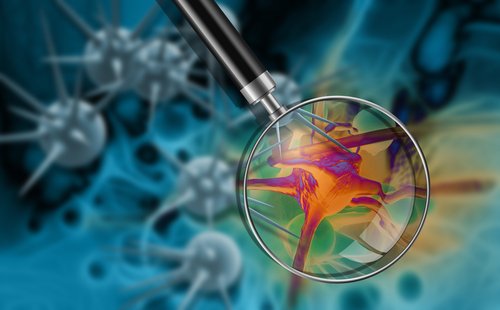Researchers at Moffitt Cancer Center have revealed the mechanism that explains the transformation process of prostate cells into castration-resistant cancer cells. They’ve also identified a new drug candidate that targets this specific mechanism, preventing the growth and proliferation of these aggressive and deadly cancer cells.
The findings were featured in an article titled “ACK1/TNK2 Regulates Histone H4 Tyr88-phosphorylation and AR Gene Expression in Castration-Resistant Prostate Cancer,” published in the journal Cancer Cell.
Researchers have known for years that male hormones, called androgens, and their receptor-driven signals are essential for the development of prostate cancer. Therefore, the first line of treatment in most advanced prostate cancer cases are drugs that reduce the activity of androgens, such as Astellas Pharma’s Xtandi (enzalutamide), or surgical removal of the testicles – where these hormones are produced.
Despite the benefits provided by these therapeutic strategies, many patients develop a more aggressive type of cancer within two or three years, called metastatic castration-resistant prostate cancer (mCRPC). It is not yet clear how cancer cells acquire this treatment resistance or how the transformation develops, making it harder to tackle.
“Undoubtedly, the foremost reason for transient effectiveness of the androgen deprivation therapy is a poor understanding of the molecular mechanisms driving progression to castration-resistant prostate cancer, which in turn has hampered development of new therapeutics,” Nupam P. Mahajan, PhD, associate member of the Chemical Biology and Molecular Medicine Program at Moffitt and senior author of the study, said in a news release.
The Moffitt research team conducted several experiments with patients’ cancer biopsy samples, experimental cell lines, and mice models of prostate cancer. This allowed them to find that the ACK1 protein, also known as TNK2, was active in mCRPC samples and was responsible for triggering a signaling pathway that would ultimately regulate the levels of certain genes.
This result was of particular interest because the researchers found that ACK1 was inducing a modification in the DNA very closely to the region were the androgen receptor is coded. After further analysis, they observed that this DNA modification was actually driving the expression of the receptor, increasing its activity even when prostate cancer cells had been treated with anti-androgen therapy.
Based on this discovery, the researchers hypothesized that if they could target the mechanism, perhaps they could attack mCRPC cells more efficiently. They designed a new drug to target ACK1, which they called (R)-9bMS. Inhibiting ACK1 blocked the DNA modifications mediated by this enzyme and consequently the activation of the androgen receptor gene. Importantly, (R)-9bMS blocked the growth of anti-androgen resistant prostate cancer cells and decreased the growth of mCRPC tumors in mice.
“This discovery is highly relevant because almost two thirds of castration-resistant prostate cancer patients do not respond to enzalutamide [Xtandi]. Overall, (R)-9bMS opens up as a new, and desperately needed, therapeutic option for those castration-resistant prostate cancer patients who either do not respond to [Xtandi] or have acquired resistance, post-treatment,” said Dr. Kiran Mahajan, first author of the study.

